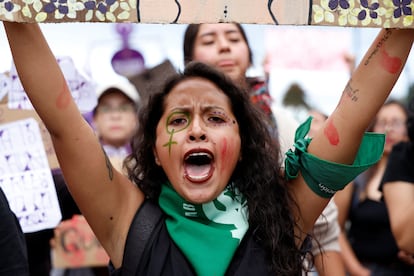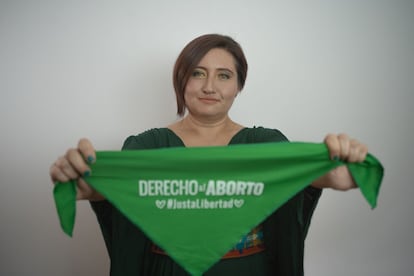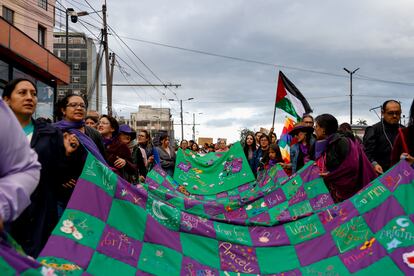The green tide arrives in Ecuador: A new movement demands the decriminalization of abortion at the Constitutional Court
Eight women’s organizations launch the National Just Freedom Movement to fight for the legalization of abortion and file a lawsuit before the Constitutional Court

The fight to decriminalize abortion in Latin America is no longer a tide but a tsunami. This Tuesday Ecuadorian women are taking a step similar to the one that led Colombian, Mexican and Argentine women to achieve progress in the battle for access to abortion. This Wednesday, organizations that belong to the National Just Freedom Movement filed a lawsuit with the Constitutional Court of Ecuador to demand the elimination of the crime of abortion, which has been in the country’s penal code for 152 years.
Article 149 of the code has led to the prosecution of at least 493 people over the last 10 years; they have been sentenced to between 6 months and 1 year in prison. As has happened in other countries in the region, in Ecuador, the criminalization of abortion forces vulnerable women to have unsafe abortions. According to Human Rights Watch, poorer and rural women are particularly affected. “Low-income women appeared to be more likely to be prosecuted, including in cases of miscarriage or when they urgently needed post-abortion medical care,” the human rights organization said in 2021.
The decision to file the lawsuit before the Court brought together organizations such as Surkuna, Las Comadres [Godmothers], Alianza de DD HH [Human Rights Alliance], Amazon Frontlines, Bolena, CEPAM [Ecuadorian Center for Women’s Advancement and Action] Guayaquil, Fundación Lunita Lunera and Sendas [Paths], which have been working on access to reproductive rights for women in Ecuador. But the lawsuit is also supported by opinion leaders, artists, activists and various entities in the international community. Encouraged by the decriminalization of abortion in Colombia, they began to organize last year, and this Tuesday they are launching the movement by filing the lawsuit.
“Ecuador is ready”
Ana Vera, a lawyer and a movement spokesperson, says that Ecuador is ready to decriminalize abortion. “We have seen a global trend and political processes like the Latin American green tide in which we are moving toward eliminating the use of criminal law to regulate women’s reproductive decisions. In Ecuador, it is urgent and necessary that this crime be eliminated,” she says. Vera cites a 2021 survey by the Cedatos research and data center that indicates that 8 out of 10 people are against the prosecution of women who have abortions.

Regarding the executive branch, Vera also identifies other factors that allow them to evaluate what the government thinks. “Ecuador has received multiple recommendations from human rights committees to eliminate the crime of abortion and recently, the Universal Periodic Review countries like Mexico, Iceland and South Africa recommended the same. Ecuador accepted that recommendation; we see this as an act of good faith on the part of the Ecuadorian state.”
For its part, she says, the Court has shown a commitment to reproductive rights in addition to its recent ruling legalizing euthanasia. “We hope that it lives up to the historical moment it is experiencing and recognizes the serious violation implied by the criminalization of abortion, especially for impoverished women,” the lawyer says.
In Ecuador, abortion is permitted on three grounds: life, health and rape. But criminalization and stigmatization continue to be a barrier that can come at the expense of the lives of women who resort to clandestine and unsafe abortions. According to World Health Organization (WHO) estimates, approximately every hour seven Ecuadorian women are forced to resort to abortions in unknown and often risky conditions. Furthermore, according to figures from Ecuador’s Ministry of Public Health, 54 girls, teenagers and women were hospitalized every day for abortion-related causes in 2022.

Accompanied by Colombia’s Just Cause Movement, which achieved the decriminalization of abortion after working long and hard, Ecuadorian women are beginning the legal path to eliminate its criminalization. Today, while the lawsuit is being filed, there will be symbolic actions before the Constitutional Court in Quito as well as in cities such as Guayaquil, Cuenca, Machala, Esmeraldas, Tulcán and Lago Agrio. “We want access to abortion to stop being a privilege for the few and become a right for all,” Vera says about what they hope to accomplish with the lawsuit.
Sign up for our weekly newsletter to get more English-language news coverage from EL PAÍS USA Edition
Tu suscripción se está usando en otro dispositivo
¿Quieres añadir otro usuario a tu suscripción?
Si continúas leyendo en este dispositivo, no se podrá leer en el otro.
FlechaTu suscripción se está usando en otro dispositivo y solo puedes acceder a EL PAÍS desde un dispositivo a la vez.
Si quieres compartir tu cuenta, cambia tu suscripción a la modalidad Premium, así podrás añadir otro usuario. Cada uno accederá con su propia cuenta de email, lo que os permitirá personalizar vuestra experiencia en EL PAÍS.
¿Tienes una suscripción de empresa? Accede aquí para contratar más cuentas.
En el caso de no saber quién está usando tu cuenta, te recomendamos cambiar tu contraseña aquí.
Si decides continuar compartiendo tu cuenta, este mensaje se mostrará en tu dispositivo y en el de la otra persona que está usando tu cuenta de forma indefinida, afectando a tu experiencia de lectura. Puedes consultar aquí los términos y condiciones de la suscripción digital.









































